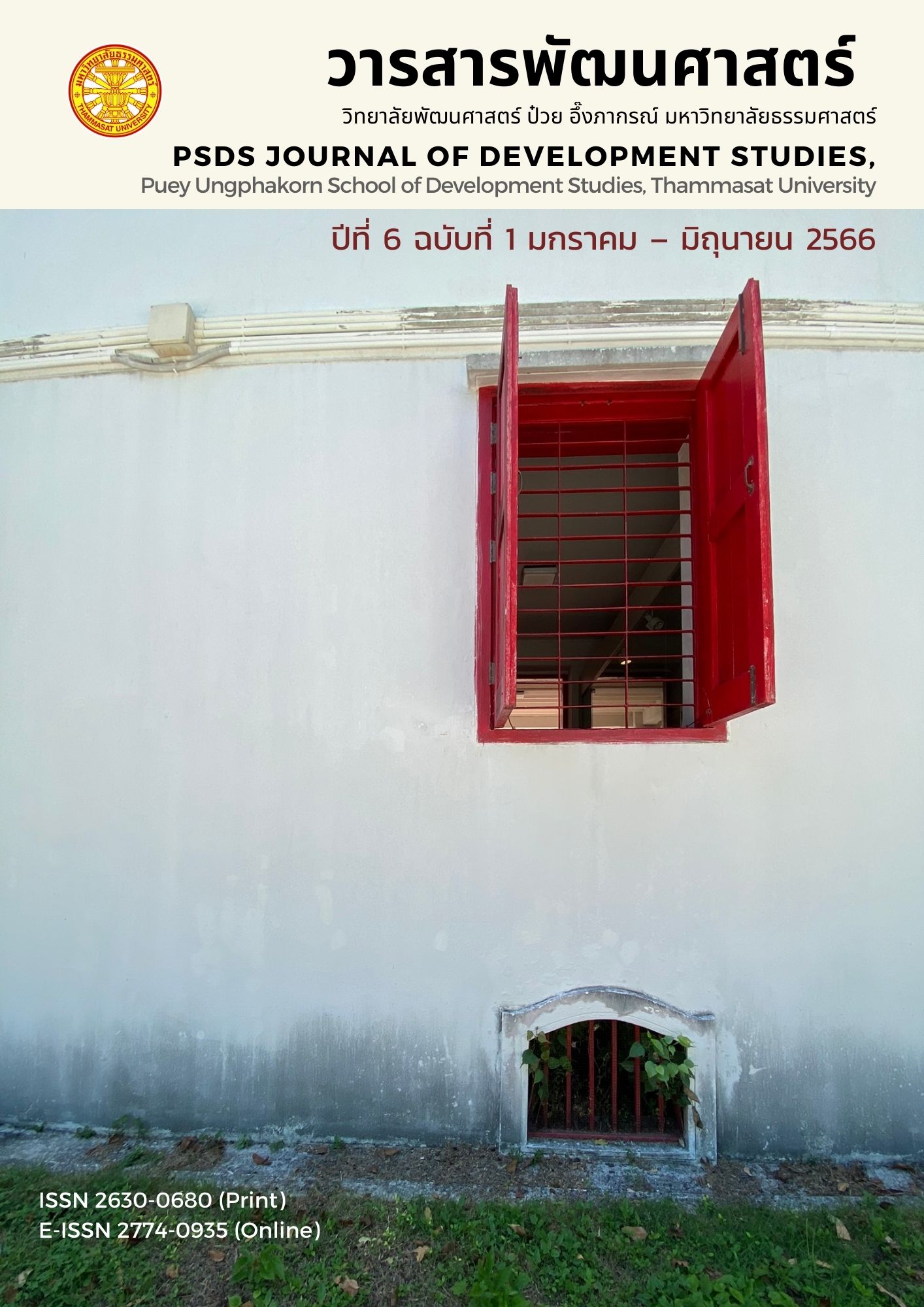เมื่อตระหนักถึงอำนาจที่ไม่เท่าเทียม: ประสบการณ์ของครูนักเคลื่อนไหวผู้ต่อต้านการใช้ความรุนแรงภายในโรงเรียน
คำสำคัญ:
ครูนักเคลื่อนไหว, ความเป็นธรรมทางสังคม, ความรุนแรงในโรงเรียน, ความสัมพันธ์เชิงอำนาจ, การศึกษาเชิงวิพากษ์บทคัดย่อ
บทความวิจัยนี้ศึกษาประสบการณ์ของครูระดับชั้นมัธยมศึกษาโรงเรียนรัฐบาลที่ต่อต้านการใช้ความรุนแรงในพื้นที่ห้องเรียนและโรงเรียนของตนเอง โดยศึกษาว่าทำไมครูเหล่านี้จึงเลือกไม่ใช้ความรุนแรงหรือเลือกเคลื่อนไหวในประเด็นนี้ และมีวิธีการเคลื่อนไหวอย่างไร โดยใช้กรอบแนวคิดการศึกษาเชิงวิพากษ์เพื่ออธิบายการเลือกไม่ใช้ความรุนแรงของครูในฐานะการทำงานทางการเมืองรูปแบบหนึ่ง และ ใช้กรอบแนวคิดความเป็นธรรมทางสังคมเพื่อทำความเข้าใจเป้าหมายการขับเคลื่อนของครู บทความวิจัยนี้เป็นงานวิจัยเชิงคุณภาพ เก็บข้อมูลผ่านวิธีการสัมภาษณ์เชิงลึก ผลการศึกษาพบว่า เมื่อครูตระหนักรู้ว่าความรุนแรงเป็นผลพวงของโครงสร้างทางอำนาจและความสัมพันธ์เชิงอำนาจที่เท่าไม่เทียมในระบบการศึกษา ส่งผลให้พวกเขาไม่ใช้ความรุนแรงในจัดการการเรียนการสอน และการจัดการชั้นเรียน แต่เน้นการเสริมพลังและลดความต่างชั้นระหว่างครูและนักเรียนลง นอกจากนี้ยังขยายผลผ่านการสร้างพันธมิตรทั้งในและนอกโรงเรียนเพื่อเสริมให้ความเคลื่อนไหวมีความแข็งแกร่งยิ่งขึ้น ผู้วิจัยเห็นว่า แม้ครูเหล่านี้จะใช้วิธีการเคลื่อนไหวที่ไม่โจ่งแจ้ง (implicit activism) กล่าวคือการเริ่มสร้างความเปลี่ยนแปลงจากชั้นเรียนและเครือข่ายของตนเอง แต่การเคลื่อนไหวของครูกลุ่มนี้ เป็นการสร้างความเป็นธรรมทางสังคม เนื่องจากวิธีจัดการเรียนการสอนของครู มุ่งเน้นการเสริมพลัง (empower) ให้การแก่นักเรียนที่ถูกทำให้อยู่ในสถานะผู้ไร้อำนาจ (powerless) มาโดยตลอด
Downloads
เอกสารอ้างอิง
กระทรวงศึกษาธิการ. (2551). หลักสูตรแกนกลางการศึกษาขั้นพื้นฐาน พุทธศักราช 2551, 8 พฤษภาคม 2565. http://academic.obec.go.th/images/document/1559878925_d_1.pdf.
กานน คุมพ์ประพันธ์ และอุฬาชา เหล่าชัย. (2563). สำรวจวาทกรรมเกี่ยวกับการจัดการชั้นเรียนและการลงโทษในระดับชั้นมัธยมศึกษา. [เอกสารยังไม่เผยแพร่]
ไทยรัฐออนไลน์. (2564 มิถุนายน 21). ผู้ปกครองโวย ครูโรงเรียนที่อ่างทองลงโทษตีมือ เด็ก ป.5 จนต้องเข้าเฝือก. 8 พฤษภาคม 2565. https://www.thairath.co.th/news/local/central/2120920.
พระราชบัญญัติคุ้มครองเด็ก พ.ศ.2546. (2546, 2 ตุลาคม). ราชกิจจานุเบกษา. เล่ม 120 ตอนที่ 95.หน้า 26.
ระเบียบกระทรวงศึกษาธิการว่าด้วยการลงโทษนักเรียนและนักศึกษา พ.ศ. 2548. (2548, 26 เมษายน). ราชกิจจานุเบกษา. เล่ม 122 ตอนพิเศษ 35 ง. หน้า 18
วสันต์ ปวนปันวงศ์ และ ภานุวัฒน์ ฟูจักรคำ. (2563). ครู–ศิษย์: ความสัมพันธ์แบบอำนาจนิยม ความมืดบอดของการถ่ายทอดองค์ความรู้, วารสารวิทยาลัยสงฆ์นครลำปาง, 9(3), 246-259.
ศิวรักษ์ ศิวารมย์. (2551). สังคมศาสตร์การศึกษา. กรุงเทพฯ: สร้างสรรค์.
สุรวิทย์ อัสสพันธ์ และอุฬาชา เหล่าชัย. (2562). คนรุ่นใหม่ที่ขับเคลื่อนการศึกษา. ใน รูปแบบและแนวทางการเรียนรู้ของเด็กและเยาวชนรุ่นใหม่ (Generation Z). คณะวิทยาการเรียนรู้และศึกษาศาสตร์ มหาวิทยาลัยธรรมศาสตร์.
สโมสรนิสิตคณะศึกษาศาสตร์ มหาวิทยาลัยบูรพา. (มปป). รายงานผลการดำเนินงาน โครงการกีฬาประเพณีครุศาสตร์-ศึกษาศาสตร์สัมพันธ์ (ไม้เรียวเกม) คร้ังที่ 18, 8 พฤษภาคม 2565. http://apps.buu.ac.th/strategic/dataup/oprdoc_150648699407225700.pdf.
ออมสิน จตุพร. (2019). บทวิจารณ์หนังสือ Giroux, H.A. (2013). On Critical Pedagogy. New York and London: Bloomsbury Academic. วารสารศิลปศาสตร์ มหาวิทยาลัยธรรมศาสตร์, 19(1), 196–210. https://doi.org/10.14456/lartstu.2019.9
อุฬาชา เหล่าชัย, สิทธิชัย วิชัยดิษฐ์, ฝน นิลเขต, ปวีณา แช่มช้อย, อดิศร จันทรสุข. (2565). ก่อการครู: ขบวนการเคลื่อนไหวในโลกการศึกษา. โครงการผู้นำแห่งอนาคต คณะวิทยาการเรียนรู้และศึกษาศาสตร์ มหาวิทยาลัยธรรมศาสตร์.
เอกสารภาษาอังกฤษ
Atkinson, R. (1998). The life story interview. Sage.
Ayers, R., & Ayers, W. (2014). Teaching the taboo: Courage and imagination in the classroom. Teachers College Press.
Bartolome, L. (1994). Beyond the methods fetish: Toward a humanizing pedagogy. Harvard educational review, 64(2), 173-195.
Berger, B. K. (2005). Power over, power with, and power to relations: Critical reflections on public relations, the dominant coalition, and activism. Journal of Public Relations Research, 17(1), 5-28.
Bryman, A. (2008). Social research methods. New York: Oxford University Press.
Bryman, A. (2012). Social research methods. Oxford university press.
Catone, K. C. (2014). The pedagogy of teacher activism: Four portraits of becoming and being teacher activists. Harvard University.
Collay M. (2010). Retracing the roots of teacher activism in urban schools. Education, Citizenship and Social Justice, 5(3), 221-233.
DeMatthews, D. E. (2018). Community engaged leadership for social justice: A critical approach in urban schools. Routledge.
Flyvbjerg, B. (2006). Five Misunderstandings About Case-Study Research. Qualitative Inquiry, 12(2), 219–245.
Fraser, N. (1996). Social justice in the age of identity politics: redistribution, recognition and participation, Retrieved May 8, 2022. from URL http://tannerlectures.utah.edu/_documents/a-to- z/f/Fraser98.pdf
Freire, P. (2000). Pedagogy of the Oppressed (30th anniversary ed.). New York: Bloomsbury.
Giroux, H. A. (1981). Ideology, culture, and the process of schooling. Philadelphia, PA: Temple University Press.
Giroux, H. A. (2004). Public Pedagogy and the Politics of Neo-Liberalism: Making the Political More Pedagogical. Policy Futures in Education, 2(3–4), 494–503.
Gottesman, I. (2016). The critical turn in education: From Marxist critique to poststructuralist feminism to critical theories of race. Routledge.
Horton, J., & Kraftl, P. (2009). Small acts, kind words and “not too much fuss”: Implicit activisms. Emotion, Space and Society, 2(1), 14–23.
Hytten, K., & Bettez, S. C. (2011). Understanding education for social justice. Educational foundations, 25, 7-24.
Johansson, A., & Vinthagen, S. (2019). Conceptualizing ‘Everyday Resistance’: a transdisciplinary approach. Routledge.
Johnson, L. (2002). “Making democracy real”: Teacher union and community activism to promote diversity in the New York City public schools, 1935–1950. Urban Education, 37, 566–587.
Lena Bahou. (2012). Cultivating student agency and teachers as learners in one Lebanese school, Educational Action Research, 20(2), 233-250.
Levine, D., & Au, W. (2013). Rethinking schools: Enacting a vision for social justice within US education. Critical Studies in Education, 54(1), 72-84.
Luguetti, C., & Oliver, K. L. (2021). A transformative learning journey of a teacher educator in enacting an activist approach in Physical Education Teacher Education. The Curriculum Journal, 32(1), 118-135.
Marshall, C. and Anderson, A. L. (2009). Activist educators: Breaking past limits. New York: Routledge.
Morse, J. M. (2000). Determining sample size. Qualitative Health Research, 10(1), 3-5.
North, C. (2008). What is all this talk about “social justice”? Mapping the terrain of education’s latest catchphrase. Teachers College Record, 110(6), 1182–1206.
Picower, B. (2012a). Practice What You Teach: Social Justice Education in the Classroom and the Streets. New York: Routledge.
Picower, B. (2012b). Teacher Activism: Enacting a Vision for Social Justice. Equity & Excellence in Education, 45(4), 561-574.
Rawls, J. (1971). A Theory of Justice. Oxford: Oxford University Press.
Rendell, J. (2021). After the Strike? Part 1: The Transitional Space of the Picket Line. Architecture and Culture, 9(2),179-192.
Richards, J. C., & Lockhart, C. (1994). Reflective teaching in second language classrooms. New York: Cambridge university press.
Riley, K., & Solic, K. (2017). “Change Happens Beyond the Comfort Zone” Bringing Undergraduate Teacher-Candidates Into Activist Teacher Communities. Journal of Teacher Education, 68(2), 179-192.
Ryan, J. (2016). Strategic activism, educational leadership and social justice. International Journal of Leadership in Education, 19(1), 87-100.
Stake, R. E. (1995). The art of case study research. sage.
Starhawk. (1990). Truth or dare: Encounters with power, authority, and mystery. San Francisco: HarperSanFrancisco.
Theoharis G. (2007). Social Justice Educational Leaders and Resistance: Toward a Theory of Social Justice Leadership. Educational Administration Quarterly. 43(2), 221-258.
Wiedeman, C. R. (2002). Teacher preparation, social justice, equity: A review of the literature. Equity &Excellence in Education, 35(3), 200-211.
Young, I. (2011). Five Faces of Oppression, in Justice and the Politics of Difference. Princeton: Princeton University Press.
Zembylas, M. (2013). Mobilizing ‘implicit activisms’ in schools through practices of critical emotional reflexivity. Teaching Education, 24, 84–96.
ดาวน์โหลด
เผยแพร่แล้ว
รูปแบบการอ้างอิง
ฉบับ
ประเภทบทความ
สัญญาอนุญาต
ลิขสิทธิ์ (c) 2023 Ganon Koompraphant, U-lacha Laochai

อนุญาตภายใต้เงื่อนไข Creative Commons Attribution-NonCommercial-NoDerivatives 4.0 International License.






